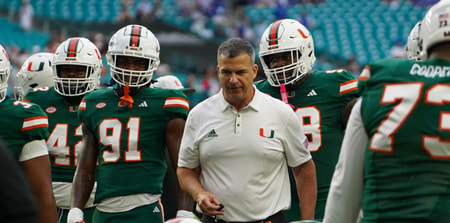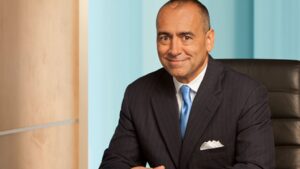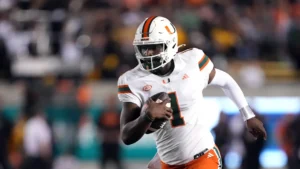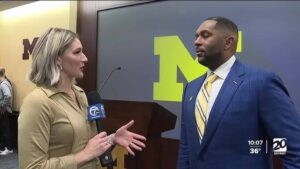
JUST IN: Miami Hurricanes Deserve Their Top 4 Ranking, According to Coach
The University of Miami Hurricanes have long been a force to be reckoned with in college football. From their dominance in the 1980s to their resurgence in recent years, the program has cultivated a rich tradition of excellence. Their most recent ascent into the top 4 of college football rankings, following a period of rebuilding and restructuring, has led to widespread discussion. Some skeptics question whether their high ranking is truly warranted, while others view it as a long-overdue recognition of the Hurricanes’ resurgence. According to head coach Mario Cristobal, the Hurricanes’ place among the top teams in the country is more than justified—and here’s why.
A Tradition of Excellence
The Miami Hurricanes have built one of the most storied programs in college football history. With five national championships (1983, 1987, 1989, 1991, and 2001) and numerous conference titles, the Hurricanes have earned their place in the college football pantheon. The program has produced a long list of NFL stars, including legendary players such as Michael Irvin, Ray Lewis, Ed Reed, and Warren Sapp, who have solidified the Hurricanes’ legacy in the professional ranks as well.
But what makes Miami’s rise back into the elite rankings so compelling is the context of the college football landscape in recent years. After a prolonged period of underachievement—marked by coaching changes, a lack of stability, and inconsistent recruiting—the Hurricanes appear to be back in the spotlight, and it’s no accident.
The Return of Mario Cristobal
In 2021, Miami brought Mario Cristobal back home. The former Miami player and Oregon head coach was tasked with restoring the program to its former glory. Cristobal, who played a pivotal role in turning around Oregon’s football program, was seen as a perfect fit for Miami’s high standards. His hiring represented a return to the program’s roots—his fiery passion, work ethic, and recruiting prowess made him a high-profile figure in the college football world.
Cristobal’s arrival was met with optimism from Miami fans and critics alike, but turning around a program that had fallen from grace over the past decade would take time. However, Cristobal wasted no time in addressing Miami’s most pressing needs: talent acquisition, player development, and establishing a culture of accountability and discipline.
Cristobal’s recruiting strategy, which prioritized bringing in high-caliber players from the state of Florida, has already begun to pay dividends. Under his leadership, the Hurricanes have consistently recruited at a top-tier level, attracting talent that has the potential to compete at the highest level of college football.
On-Field Improvements
Since Cristobal’s arrival, Miami has made substantial strides in various aspects of the game. The Hurricanes have become more competitive in both the ACC and national rankings. Their defense, once a weak point, has been transformed into one of the most formidable units in the country. The offense has also undergone significant improvements, as Cristobal works to build a balanced, explosive attack.
1. The Defense: A Return to the U’s Roots
Miami has always been known for its dominant defenses. From the “Gang Green” defense of the 1980s to the “The U” teams of the early 2000s, the Hurricanes have always fielded aggressive, opportunistic defenses that could change the course of a game in an instant. Under Cristobal, the Hurricanes are again making waves on the defensive side of the ball.
With defensive coordinator Kevin Steele at the helm, Miami’s defense has made dramatic strides. The Hurricanes have adopted a physical, attacking style, getting after the quarterback, stopping the run, and creating turnovers. Steele has implemented a system that emphasizes speed, athleticism, and intensity—traits that have always been part of the Miami identity. The defensive line, in particular, has seen major improvement, with players like Leonard Taylor and Akheem Mesidor becoming anchors of a dominant front seven.
In the secondary, Miami has a talented group of players who can lock down receivers and create opportunities for turnovers. The combination of a potent pass rush and a locked-in secondary makes Miami’s defense one of the toughest to beat.
2. The Offense: Balanced and Efficient
On the offensive side of the ball, Miami has focused on creating balance and explosiveness. With Cristobal’s background as an offensive line coach, it’s no surprise that one of the primary focuses of the program has been building a powerful and consistent offensive line. The line has shown major improvement, providing adequate protection for the quarterbacks and opening up running lanes for the running backs.
Quarterback play, an area of weakness for Miami in recent seasons, has also improved under Cristobal’s watch. The arrival of transfer quarterback Tyler Van Dyke was a major turning point for the Hurricanes. Van Dyke, who had a standout freshman season, provides Miami with the leadership and skill at quarterback that the team has lacked in recent years. With Van Dyke at the helm, Miami’s passing attack has become more dangerous, and the offense has gained a new level of efficiency.
Miami’s running back room, which features standout players like Henry Parrish Jr. and Don Chaney Jr., has become a threat in its own right. Cristobal’s commitment to establishing a strong ground game has helped Miami control the tempo of games and maintain balance on offense.
3. Special Teams: An Underappreciated Factor
In addition to improvements on offense and defense, special teams have been a point of emphasis under Cristobal. Special teams may not receive the same attention as other phases of the game, but they are critical to winning close games and swinging momentum. Miami’s special teams play has seen notable improvement, especially in the kicking game, where the Hurricanes now have reliable options in both field goal kicking and punting.
The Strength of the ACC
One of the primary arguments for Miami’s place in the top 4 of the rankings is the strength of the Atlantic Coast Conference (ACC). While some critics have pointed out that the ACC as a whole has been somewhat down in recent years, it’s important to note that there are still several highly competitive teams within the conference. Miami’s success has been fueled in part by the ability to compete against top-tier teams within the ACC, such as Clemson, Florida State, and North Carolina.
Clemson, long regarded as the class of the ACC, is still a formidable opponent, and Miami’s ability to compete at a high level within the conference provides valuable validation for their ranking. Similarly, Florida State has emerged as one of the top programs in the country, and Miami’s recent success against their in-state rivals provides further evidence that the Hurricanes are back on the national stage.
Miami’s victories over top ACC teams this season, along with their impressive performances against non-conference opponents, have solidified their spot in the top 4. Their dominance within the conference and their ability to handle top-tier competition have earned them the respect they deserve.
Miami’s Recruiting Success
A major factor in Miami’s rise back to the top has been their success on the recruiting trail. Cristobal, who is widely regarded as one of the best recruiters in college football, has made it a priority to recruit the best talent, particularly within the state of Florida. This strategy has paid off, as Miami has consistently landed top-tier recruits, especially on the defensive side of the ball.
The Hurricanes have made it a point to bring in blue-chip recruits at key positions, including quarterback, offensive line, defensive line, and linebacker. Miami’s recruiting classes in recent years have been ranked among the best in the nation, and these recruits are starting to make an immediate impact on the field.
In addition to local talent, Cristobal has also managed to expand Miami’s recruiting footprint beyond the state of Florida, bringing in top players from across the country. This broader recruiting approach has helped solidify the team’s depth and overall talent level.
The Coaching Staff
While Cristobal is the face of the program, he is supported by a talented and experienced coaching staff that has helped shape Miami’s success. The staff is filled with individuals who have a proven track record of developing talent and winning at the highest levels.
Coordinators like Kevin Steele on defense and Shannon Dawson on offense have brought a wealth of experience to the team, and their schemes have been a perfect fit for the players they are coaching. Steele’s aggressive defensive style and Dawson’s balanced offensive attack have provided Miami with the blueprint for success.
The strength of the coaching staff, combined with Cristobal’s leadership, has created an environment where players are motivated to succeed and reach their full potential. The commitment to player development and a culture of competition has been key to Miami’s return to prominence.
The Case for Miami’s Top 4 Ranking
Miami’s rise to the top 4 of the rankings isn’t based on a fluke or a soft schedule—it’s the result of a complete program overhaul, a committed coaching staff, elite-level talent acquisition, and, most importantly, consistent, high-level play on the field. The Hurricanes have proven they are more than just a flash in the pan. They have established themselves as one of the top programs in the country.







